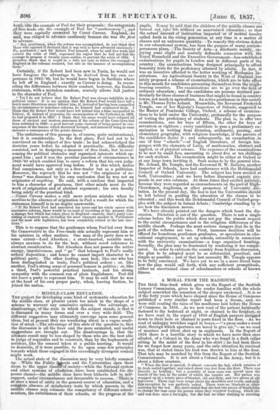MIDDLE-CLASS EDUCATION.
THE project for developing some kind of Systematic education for the middle class, present exists too much in the 'shape of a scheme to warrant any conclusive opinion. One adVantage' or disadvantage, of the state in which the subject stands, is that it is discussed in.-Many forms and over a very wide field."-The different suggesters -may ultimately converge upon some general ideas, but at present they are wandering about in a vague condition of mind..7.•:The-advantage Of this state of the question-is, that the discussion is all the freer and the more animated, and useful suggestions are brought out. The disadvantage is, 'that the ultimate result may be less shaped by those who are the best able to judge of requisites and to construct, than by the haphazards of accident, like the counsel taken at a public meeting. It would be desirable, if it were possible, to fix upon some few principles towards which those engaged in this exceedingly divergent council raight work.
The actual state of the discussion may be very briefly summed up: -While the public _kiallools and the Universities open their ,doors to he, upper 'elasse7rotsocietyr—while.the National-system and _other systems 'of edudationhave been established .for. the poorer classes—the middle class have been hitherto left to selfsupport, under'cirounistances not favourable to success. " There is at once a want of unity in the general courseof education, and a complete absence_ of satisfactory tests by which parents in the middle classes may estimate the competency of different schoolmasters, the suitableness of their schools, or the progress of the pupils. It may be said that tile children of the middle classes are turned out into'. life without an aseertaked :education; so that the actual Oniount of instruation imparted-orOf mehtal faculty called forth in the using generation at any time is a matter of chance and an unknown quantity. To remedy this obvious defect in our educational system, has been the purpose of many contemporaneous plans. The Society of Arts—a dilettante -societY,--enjoying some slight and scarcely definable connexion With the Royal Household and the Executive Government,—has. established examinations for pupils in London and in different parts of the country; the examinations being designed principally to afford honorary tests for the proficiency attained by adults. In fact, it was an incentive afforded to the better working Of Mechanics 'Institutions. An Agricultural Society in the West of -England has lately proposed a scheme of examinations, which are to take effect in this month for candidates presenting themselves from the-neighbouring counties. The examinations are to goover the fieldof ordinary education ; and the candidates are persons destined-particularly for those classes of business that might be found in country towns, not much in agriculture. An active gentleman in this society is Mr. Thomas Dyke Acland. Meanwhile, the Reverend Frederick Temple, one of her Majesty's Inspectors of . Schools, siigkeStia to the Master of Pembroke College, Oxford, a scheme of examinations to be held under the University, professedly for the purpose of testing the proficiency of students. The plan is, to offer two examinations, one for boys of fifteen, the other for boys of seventeen or eighteen ; every candidate to pass a preliminary examination in writing from dictation' arithmetic, parsing, .and elementary geography, with religious knowledge, if the parents of the candidates desire it ; and subsequently, an examination in one Of four "schools "—of English literature, of foreign languages with the elements of Latin, of mathematics, abstract and applied, or of physical science. The expenses of the examinations to -be met by small fees, amounting to about five or ten shillings for each student. The examination might be either at Oxford or at any large town inviting it. Such seems to be the general idea. Mr. Acland, Mr. Temple, and the Reverend H. W. Bellairs, another Inspector of Schools, have had conferences with the Hebdomadal Council of Oxford University. The subject has been mooted at both Universities; and we have before._ discussed cognate
posals in our own columns. At those times they excited jealousy, because they were regarded as encroachments onthe part of
HighChurchmen, Anglicans,or Other promoters of :University; -4liatation. In the present day, the fear is lest the Universities should be left behind in guiding the -education of the classes to be educated ; and this week the Hebdomadal Council of Oxford grapples with the subject in formal debate ; Cambridge standing by to see how the 'discussion moves.
We have already pointed out the dangers which beset the discussion. Dictation is out of the question. There is not a single scheme before the public which does not pay the utmost respect to the social circumstances and to the religious differences of the middle &met. Perhaps the most serious dangers that lie in the path of the reforms are two. First, immense facilities will be offered for humdrum gentlemen graduates, or speculators in educational employment, to set up schools, ostensibly in connexion with the university examinations—a huge organized humbug. Secondly, the _plan may be frustrated by rendering it too complicated. In order to extricate the country from fruitless discussion, the plan to be adopted must be as substantial, practical,and simple as possible ; and of that last necessity Mr. Temple appears to be fully convinced. We have yet to see in a more direct form how the plan would call forth, with any sufficient promptitude, either an akertained class of schoolmasters or schools of known
fitness. _ :


























 Previous page
Previous page